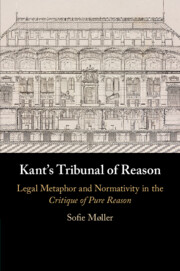Book contents
- Kant’s Tribunal of Reason
- Kant’s Tribunal of Reason
- Copyright page
- Dedication
- Contents
- Acknowledgements
- Abbreviations
- Introduction
- Chapter 1 The Critique of Pure Reason as the Establishment of Reason’s Lawful Condition
- Chapter 2 The Normativity of Law
- Chapter 3 The Transcendental Deduction of the Categories and the Tradition of Legal Deductions
- Chapter 4 The Question of Fact and the Question of Law in Judicial Imputation and in the Transcendental Deduction of the Categories
- Chapter 5 The Tribunal of Reason
- Chapter 6 Moral Conscience as the Practical Inner Tribunal
- Chapter 7 Distinguishing between Rightful Claims and Groundless Pretensions
- Chapter 8 Epistemic Authority as both Individual and Collectively Shared
- Chapter 9 Systematicity and Philosophy as the Legislation of Reason
- Conclusion
- Bibliography
- Index
Chapter 7 - Distinguishing between Rightful Claims and Groundless Pretensions
Published online by Cambridge University Press: 24 February 2020
- Kant’s Tribunal of Reason
- Kant’s Tribunal of Reason
- Copyright page
- Dedication
- Contents
- Acknowledgements
- Abbreviations
- Introduction
- Chapter 1 The Critique of Pure Reason as the Establishment of Reason’s Lawful Condition
- Chapter 2 The Normativity of Law
- Chapter 3 The Transcendental Deduction of the Categories and the Tradition of Legal Deductions
- Chapter 4 The Question of Fact and the Question of Law in Judicial Imputation and in the Transcendental Deduction of the Categories
- Chapter 5 The Tribunal of Reason
- Chapter 6 Moral Conscience as the Practical Inner Tribunal
- Chapter 7 Distinguishing between Rightful Claims and Groundless Pretensions
- Chapter 8 Epistemic Authority as both Individual and Collectively Shared
- Chapter 9 Systematicity and Philosophy as the Legislation of Reason
- Conclusion
- Bibliography
- Index
Summary
This chapter considers the presentation of reason as judge and its ability to distinguish between rightful claims and groundless pretensions. As background for this parallel, Møller considers the eighteenth-century debate on the problem of outdated laws. As a solution to this problem, two positions on judicial discretion emerged: the discretionary position, in which judges should be given greater discretion, and the positivist position, which promotes legal reform. Møller then shows that the metaphor of reason as judge should be read in consideration of the background of the debate on legal reform: at the beginning of the Critique, reason is a judge who is dissatisfied with the laws proposed by metaphysicians, but through the work these are revised and made to accord with reason’s own principles, thus making it legitimate to make judgements in accordance with the approved laws. This account of epistemic authority should be understood in connection with the formulation of cognition as judging, which makes the central question of epistemology one of legitimacy, proving which judgements thinkers can legitimately make.
Keywords
- Type
- Chapter
- Information
- Kant's Tribunal of ReasonLegal Metaphor and Normativity in the <I>Critique of Pure Reason</I>, pp. 113 - 128Publisher: Cambridge University PressPrint publication year: 2020

